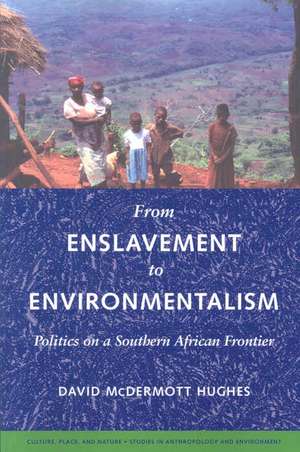From Enslavement to Environmentalism – Politics on a Southern African Frontier: Culture, Place, and Nature
Autor David Mcdermott Hughes, K. Sivaramakrishnaen Limba Engleză Paperback – mai 2008
Hughes builds his engaging analysis around a sort of natural experiment: in the past, whites colonized British Zimbabwe but avoided Portuguese Mozambique almost entirely. In Zimbabwe, chiefdoms that had historically focused on controlling people began to follow the English example of consolidating political power by dividing and controlling land. Meanwhile, in Mozambique, Portugal perpetuated traditional practices of recruiting and distributing forced labor as the primary means of securing power. The territory remained unmapped. For almost the entire twentieth century, a sharp disjuncture in the politics of land, leadership, labor, and resource use marked the border zone.
In the late 1990s, as white South Africans began to establish timber plantations in Mozambique, that difference began to be effaced. Under the banner of environmentalism and economic progress, tourism firms were allowed to claim peasant farmland. The objectives of liberal conservationists and developers, though high-minded, led them to commoditize ancestral lands. Southern African policymakers supported this new form of colonization as a form of racial integration between white investors and black peasants, paving the way for an ironic and contentious situation in which ethnic tolerance, gentrification, and land-grabbing have gone hand in hand.
"From Enslavement to Environmentalism" engages topics central to current debates in anthropology, resource politics, and development policy, and will be of interest to both regional specialists and generalists.
Din seria Culture, Place, and Nature
-
 Preț: 216.14 lei
Preț: 216.14 lei -
 Preț: 215.61 lei
Preț: 215.61 lei -
 Preț: 216.48 lei
Preț: 216.48 lei -
 Preț: 215.92 lei
Preț: 215.92 lei -
 Preț: 278.16 lei
Preț: 278.16 lei -
 Preț: 215.05 lei
Preț: 215.05 lei -
 Preț: 263.26 lei
Preț: 263.26 lei -
 Preț: 264.61 lei
Preț: 264.61 lei -
 Preț: 264.61 lei
Preț: 264.61 lei -
 Preț: 263.05 lei
Preț: 263.05 lei -
 Preț: 266.52 lei
Preț: 266.52 lei - 23%
 Preț: 645.33 lei
Preț: 645.33 lei -
 Preț: 264.99 lei
Preț: 264.99 lei - 23%
 Preț: 646.51 lei
Preț: 646.51 lei - 23%
 Preț: 646.22 lei
Preț: 646.22 lei -
 Preț: 257.86 lei
Preț: 257.86 lei -
 Preț: 261.72 lei
Preț: 261.72 lei -
 Preț: 261.72 lei
Preț: 261.72 lei -
 Preț: 266.31 lei
Preț: 266.31 lei -
 Preț: 267.51 lei
Preț: 267.51 lei -
 Preț: 270.93 lei
Preț: 270.93 lei -
 Preț: 262.67 lei
Preț: 262.67 lei -
 Preț: 261.14 lei
Preț: 261.14 lei -
 Preț: 257.66 lei
Preț: 257.66 lei -
 Preț: 271.53 lei
Preț: 271.53 lei -
 Preț: 262.11 lei
Preț: 262.11 lei -
 Preț: 258.85 lei
Preț: 258.85 lei -
 Preț: 262.29 lei
Preț: 262.29 lei - 14%
 Preț: 642.82 lei
Preț: 642.82 lei -
 Preț: 270.23 lei
Preț: 270.23 lei
Preț: 265.76 lei
Nou
Puncte Express: 399
Preț estimativ în valută:
50.85€ • 53.23$ • 42.33£
50.85€ • 53.23$ • 42.33£
Carte tipărită la comandă
Livrare economică 31 martie-14 aprilie
Preluare comenzi: 021 569.72.76
Specificații
ISBN-13: 9780295988405
ISBN-10: 0295988401
Pagini: 288
Ilustrații: 13 illustrations
Dimensiuni: 152 x 229 x 15 mm
Greutate: 0.48 kg
Editura: MV – University of Washington Press
Seria Culture, Place, and Nature
ISBN-10: 0295988401
Pagini: 288
Ilustrații: 13 illustrations
Dimensiuni: 152 x 229 x 15 mm
Greutate: 0.48 kg
Editura: MV – University of Washington Press
Seria Culture, Place, and Nature
Recenzii
" . . . an exciting and well-researched overall appraisal of the history, culture, politics, and economics of the boundary region between Zimbabwe and Mozambique. This is a regional and interdisciplinary work that deserves attention from scholars of southern Africa and anyone interested in ideas around development, environment, and power in the postcolonial African state." Jane Carruthers, UNISA, in Environmental History"An important contribution to the fields of political ecology, environmental anthropology, and Southern African studies. Hughes has combined archival research and ethnographic fieldwork to produce a historically situated account of contemporary struggles over land and development while raising fundamental questions about the nature of environment and development projects in Southern Africa." American Anthropologist"A fascinating study of the history and current state of the politics of land and people on both sides of the Mozambique-Zimbabwe border. This is a valuable work in terms of its specific coverage of the Ndau-speaking people." African Studies ReviewHughes offers a fresh, grounded and provocative take on questions central to political ecology in southern Africa. Jocelyn Alexander, Queen Elizabeth House, University of Oxford"An excellent study
[that] presents policymakers, activists, and scholars alike with an important and provocative argument that deserves to be heard." International Journal of African Historical Studies"David Hughes provides a fascinating study of the history and current state of the politics of land and people on both sides of the Mozambique-Zimbabwe border. This is a valuable work in terms of its specific coverage of the Ndau-speaking people." African Studies Review"This is an important book. Its contributions are multiple. The historical analysis of political development in these two regions of Mozambique and Zimbabwe is provocative, and suggests a novel way of viewing the dynamics of colonialism
.An important addition to the scant historiography of the region." Anthropological Quarterly "From Enslavement to Environmentalism stands out in the debate on politics around community-based conservation in Africa and is very strong empirically." Electronic Green JournalSmart and original, this book will provoke interest and controversy among both advocates and critics of neoliberal development policy in Africa. Its strength lies precisely in its bold conceptual framework and polemical style. Eric Worby, Yale University
Notă biografică
Cuprins
Abbreviations
Linguistic Conventions
Preface
Acknowledgments
Introduction: Power on African Frontiers
Part 1: Colonization, Failed and Successful
1. Compulsory Labor and Unclaimed Land in Gogoi, Mozambique, 1862-1992
2. From Clientship to Land-Grabbing in Vhimba, Zimbabwe, 1893-1990
Part 2: The Border
3. Refugees, Squatters, and the Politics of Land Allocation in Vhimba
4. Community Forestry as Land-Grabbing in Vhimba
5. Expatriate Loggers and Mapmakers in Gogoi
Part 3: Native Questions
6. Open Native Reserves or None?
7. In Conclusion, Three Liberal Projects Reassessed
Glossary
Notes
References
Index
Descriere
A challenging ethnographic and historical look at the politics of eco-development in the Zimbabwe-Mozambique border zone







